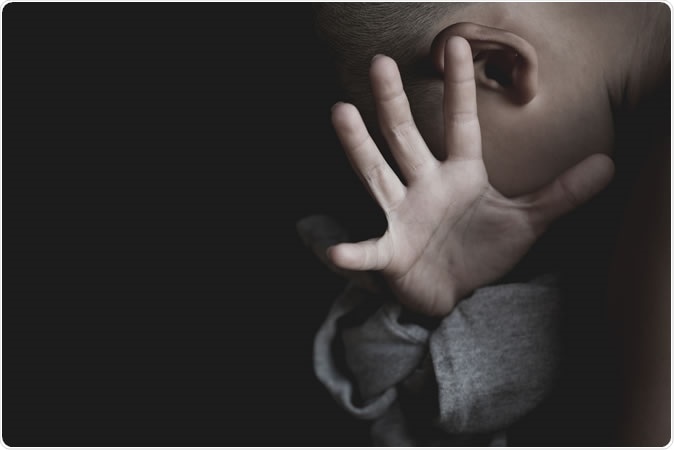
Image Credit Tinnakorn Jorruang / Shutterstock
Juvenile delinquency is a common term and reflects a behavior that is frequently observed in modern society. The term refers to the occurrence of behavior that offends criminal law in individuals who are below the age of 18 years. In other words, if these persons had been legal adults, they would have been subject to criminal prosecution. Some instances include causing damage to the property of others, injuring others by shooting or stabbing, threatening others with weapons, or being involved in fights.
The study
The authors used data retrieved from the National Longitudinal Study of Adolescent to Adult Health (Add Health), on over 10,600 participants. Add Health is a study that was carried out on a wide and nationally inclusive sample of American teenagers studying in grades 7-12 in one year, the 1994-1995 academic year. They have currently been followed up for 25 years.
The researchers looked for data on childhood abuse and poor treatment, and analyzed this information by different sorting parameters such as race, sex, ethnic origin, and sexual orientation. Their aim was to provide a more broad-based picture of what is actually happening in the field of juvenile delinquency with respect to childhood patterns.
Researcher Andra Wilkinson says, “Most of the previous research in this space used child welfare or juvenile justice data, involvement in both systems is patterned by race/ethnicity. By using a large, nationally representative sample, we are getting a more objective look at the association, among a more diverse sample, over a longer developmental period of time.”
The findings
The current study showed that well over 75% of these participants reported that they had been maltreated in at least one way in childhood. About 33% of them said they had offended the law but without the use of violence. 30% of the participants had engaged in violence during their adolescent years.
The researchers found that teenagers were more likely to become violent and to engage in more non-violent offences at an earlier age if they had been maltreated as children. Overall, adolescents were most likely to commit non-violent offences in their late teens. However, this pattern was steeper and the peak higher, indicating they began earlier and got into more trouble faster, if they had experienced more maltreatment as children.
Even with a history of maltreatment as children, males were at a significantly higher risk of committing nonviolent offences than females. However, race, ethnic origin and sexual preference did not appear to make a difference in this observed association, unlike earlier studies which showed more violent behavior in certain races when associated with childhood abuse.
Implications and future directions
The fact that the study shows males are more likely to show criminal tendencies when they come from this type of childhood background shows that risky behavior is not an intrinsically male characteristic. Instead, with boys the childhood maltreatment is probably reflected as bad and offensive behavior towards others, a process called externalization. This is a promising finding since it indicates that providing good support to such boys could well change the risk of criminal behavior as they grow.
According to the researchers, being treated violently or in any other neglectful or abusive way as a child has a negative impact on the individual for many years, and may increase the risk that such an individual will act in a way that transgresses the law. Another researcher, Hannah Lantos, pointed out, “Our research suggests that many young people involved in the juvenile justice system are struggling with the effects of trauma and earlier maltreatment, and that we should provide support for youth who have experienced maltreatment to engage in more pro-social behaviors.”
Moreover, the authors emphasize that in the current study, the participants are entering or already in the fifth decade of life, and experienced maltreatment quite a long time ago. In today’s scenario, young people who are badly treated may react differently, or in other words, a different result might result from maltreatment in childhood today.
Again, certain types of maltreatment may have more or less effects in terms of the nature of a subsequent offending behavior, or on how often such behavior is carried out. Specific relationships were not studied in this round of research.
The results of this study point to the great need to take a fresh look at where juvenile delinquents and offenders actually come from in terms of their background and childhood experiences. The more we know about these relationships, the better we can find the right places and opportunities to intervene. This could be by supporting such young people at risk, as well as reforming the juvenile justice and adult justice systems so that they take account of these factors in dealing with young and adult offenders.
The authors have published a second piece that looks at factors that could possibly break this relationship between childhood maltreatment and later delinquency.
Journal reference:
Lantos, H., Wilkinson, A., Winslow, H. et al. Describing associations between child maltreatment frequency and the frequency and timing of subsequent delinquent or criminal behaviors across development: variation by sex, sexual orientation, and race. BMC Public Health 19, 1306 (2019) doi:10.1186/s12889-019-7655-7, https://bmcpublichealth.biomedcentral.com/articles/10.1186/s12889-019-7655-7